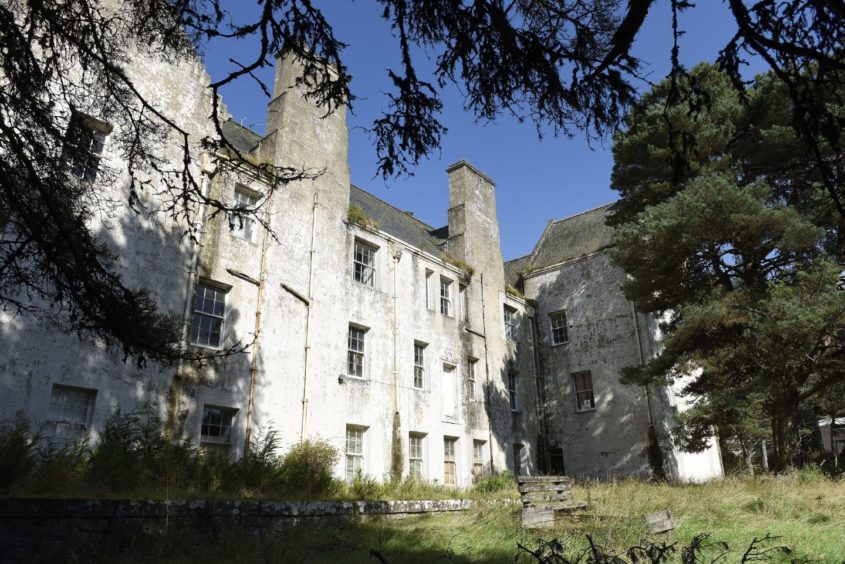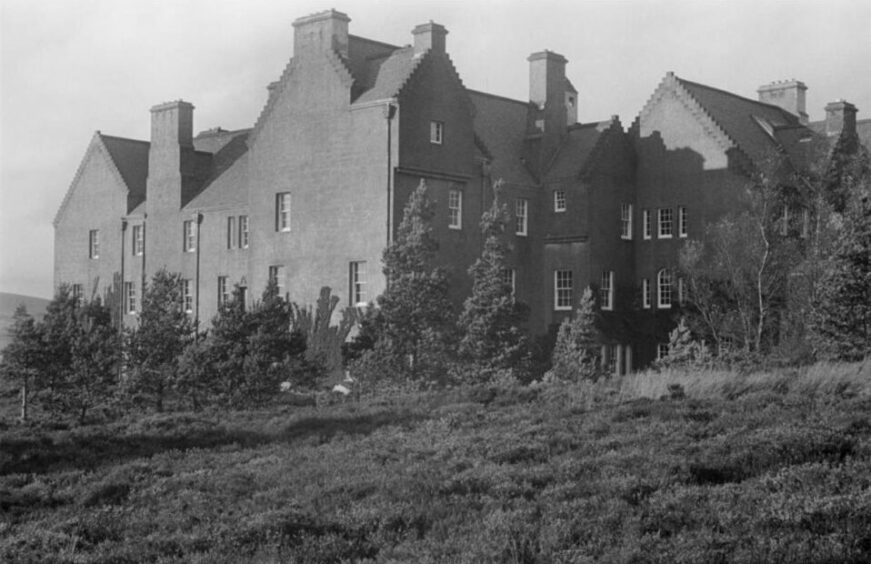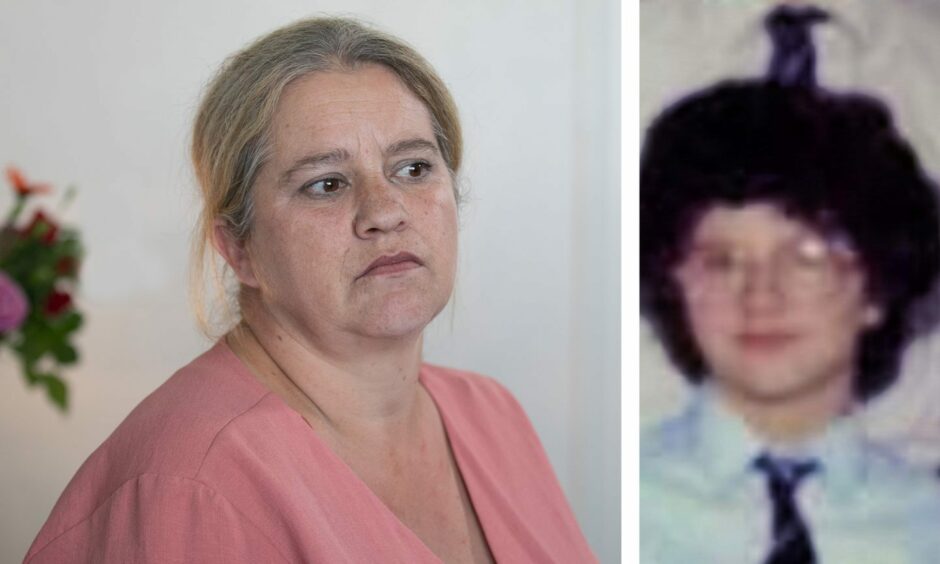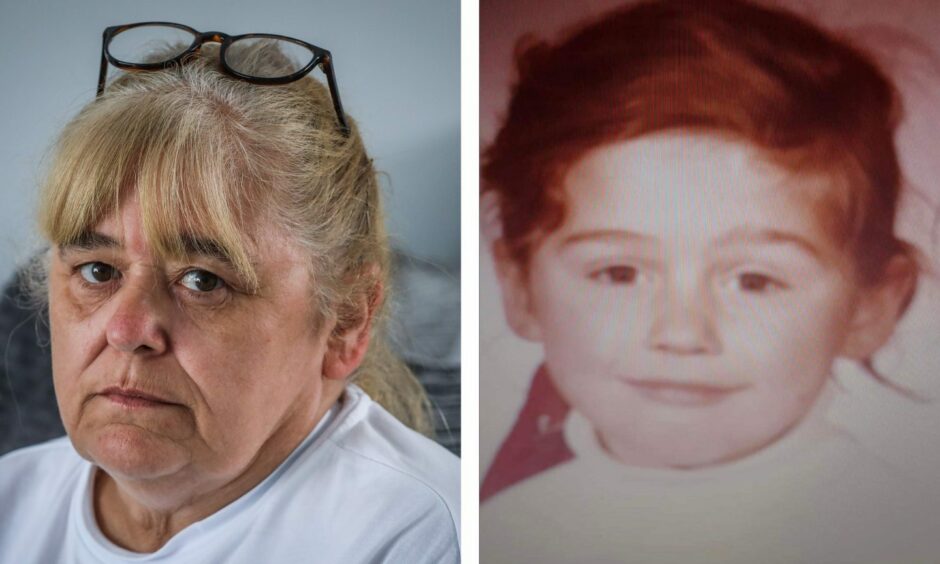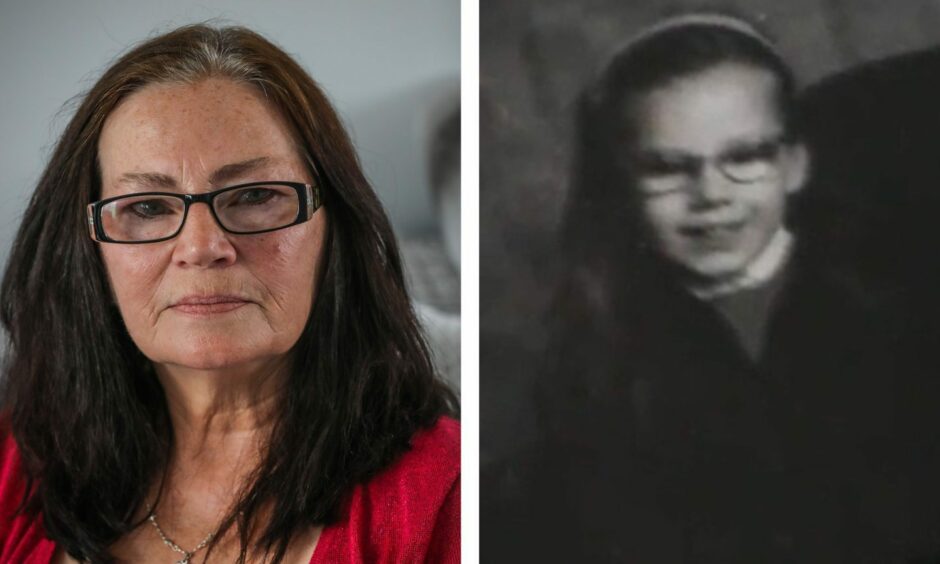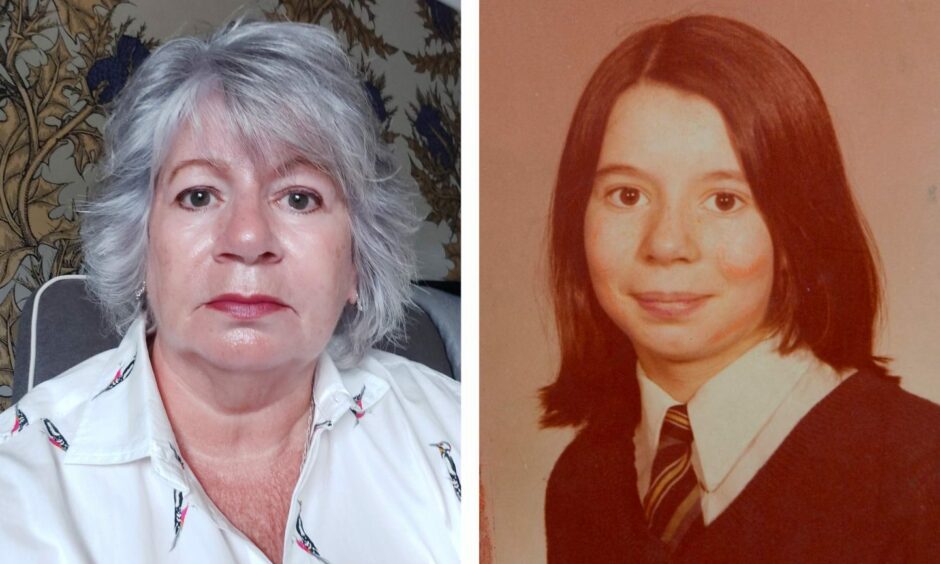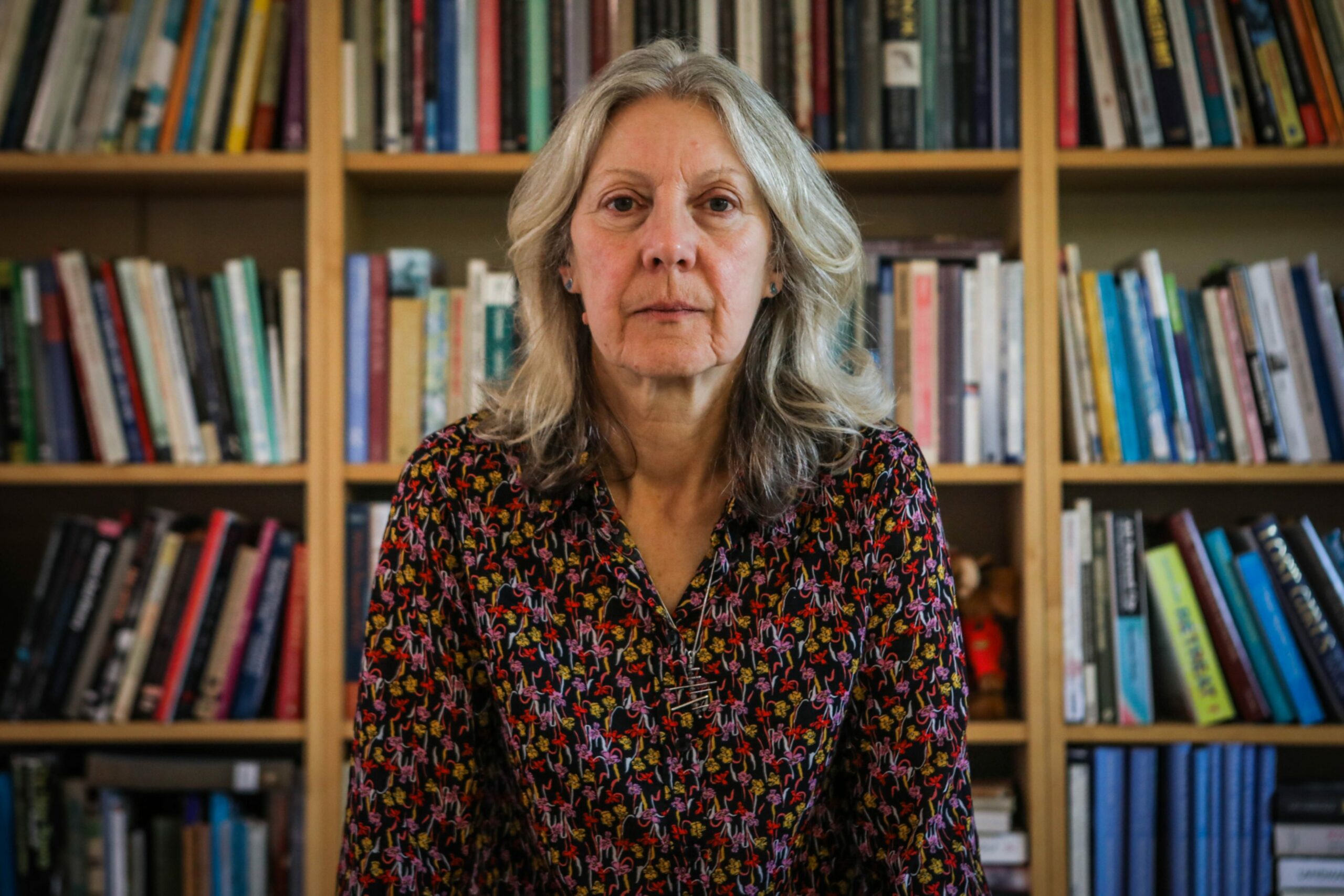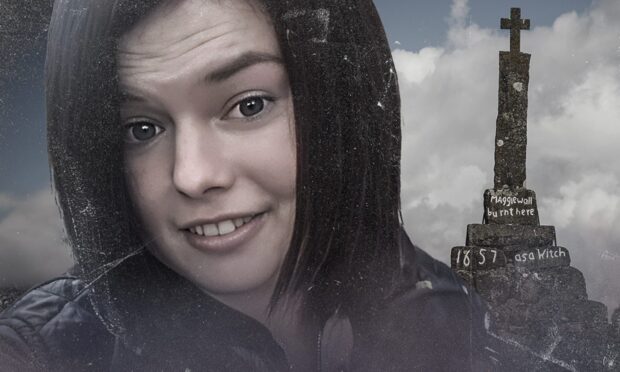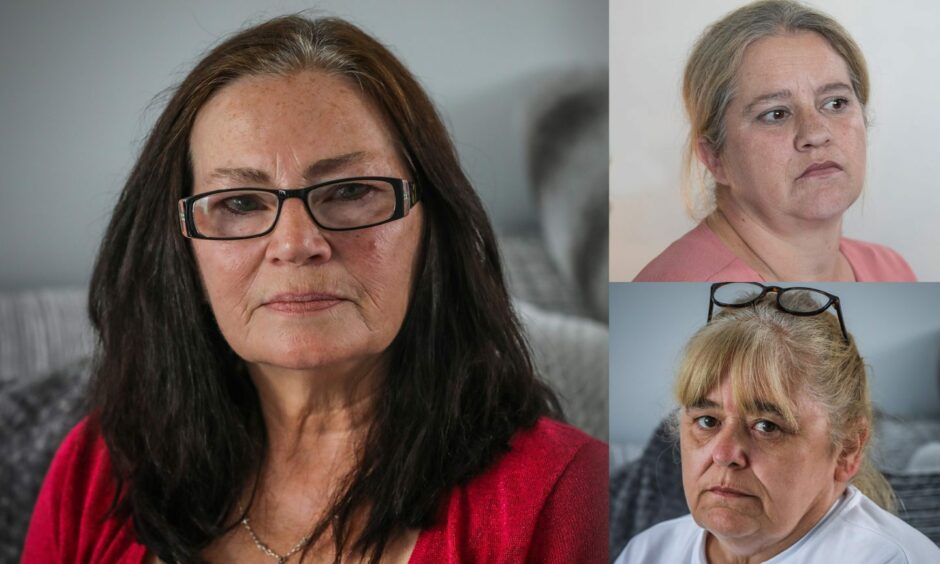
When Elaine McLaughlin lost her mum, all she had left was her dad. But he worked.
Elaine isn’t alone in her accusations.
As of September 2022, there were 166 claims of mental, physical and sexual abuse at Fornethy House Residential School in Angus.
These accusations are directed at Glasgow City Council – the former owners and operators of Fornethy House – where they sent pupils from Glasgow, some as young as five.
Former pupils have lived their whole lives with the traumatic memories of the abuse they faced at this residential school. Some victims say it “ruined my life”.
Our investigation reveals the true extent of abuse at Fornethy House from the women who lived through it.
We reveal the identity of the headmistress, Miss Margaret Fletcher. Once a pillar of the community in Kirriemuir but who victims describe as an abusive head teacher.
In this special investigation, we also reveal allegations that victims are being let down by the Scottish Government even to this day and how police might have known about an accused abuser for years but he was not prosecuted.
A “holiday” to Fornethy House in Angus
Fornethy House Residential School is surrounded by expansive farm land and sits within Fornethy Wood less than a mile from the hamlet of Kilry and within half an hour’s drive of Kirriemuir and Forfar.
It was opened on August 30, 1960 after being gifted to Glasgow City Council – then Glasgow Corporation – by the Coats family, under the agreement it was used to support disadvantaged girls.
The mansion was transformed to fit dormitories, three classrooms and a library.
The appeal to children, who were all from Glasgow, was that Fornethy House was supposed to be a “holiday” to the countryside.
At Fornethy, children could learn “about the environment, tramping through the hills and chasing through the corridors” and where they could “use the beautiful countryside to develop their art skills,” said a local newspaper article about the school.
Many girls were from deprived backgrounds and single-parent families.
A report by the Strathclyde Regional Council’s Department of Education later referred to it as a school for “deprived girls”.
In its first year of opening, the school would take in 257 girls.
For the following 30 years, the school saw thousands of girls walk through its doors.
The school closed in June 1993 but it would take 15 years for the abuse to come to light.
Speaking on video to the Courier, former pupils described being driven out of the city to the Angus countryside where, in the middle of a beautiful forest, Fornethy House stood “like a castle” waiting to greet them.
Memories of Fornethy shared on message boards
It all started when a user named “Lennox” posted on a message board.
Elizabeth Baxter was one of the first to discover the message board.
Elizabeth always remembered Fornethy in the back of her mind. Her memories kept her up at night.
Elizabeth Baxter, now 60 and living in Blackpool, was one of the first to comment on the post. She had left Scotland to work as a support worker but never forgot about Fornethy.
“Some people commented that they enjoyed it. I didn’t know how people could enjoy it,” she said.
What she didn’t put in those messages is that at age 11, while at Fornethy, she was molested by a man.
Fornethy House residential school survivors speak out
As part of this investigation, The Courier spoke to more than 20 women who bravely shared their stories of physical, mental and sexual abuse.
Some of those who came forward had previously discussed their ordeals on the message boards. Others spoke to us about their abuse for the very first time.
Nearly every one of them remember Fornethy’s longest-serving headteacher Margaret “Pearl” Fletcher.
A school run with fear
Victims told us that while under Fletcher’s watch they were in constant fear of being beaten and abused by Fletcher and her staff. Some women told us that they felt teachers abused them for a “cheap thrill”.
Margaret “Pearl” Fletcher was born in March 1934.
She was the headteacher from 1970 till at least 1991.
Pupils remember her “flowing blonde hair”.
She has been described by friends as an “old school” headteacher.
She is accused by pupils of being “strict” and “cruel”…
…and leading a regime of teachers who “enjoyed hurting children” and the power they had over them.
In her time at Fornethy she received a silver jubilee medal for her work.
Headmistress who inflicted misery
Margaret Fletcher joined Fornethy under the rule of Nellie Bremner, Fornethy’s first headmistress. She would soon succeed Bremner in that role.
Fletcher is remembered by many girls as overseeing a regime of beatings, force-feeding and emotional abuse.
In the following video, victims recall how Fletcher and other teachers would routinely dole out cruel punishments to girls.
More than 30 years later, Fletcher still brings fear to former pupils even in their adult lives.
Carol Whyte, 50, now living in Ayr, said she remembers a teacher who enjoyed striking girls on the back of the head. On one occasion Carol suspects she was knocked out and left bed ridden by a teacher.
When we showed Carol the photograph of Miss Fletcher, it was the first time she had seen her face in more than 40 years. Carol broke down crying, her reaction was visceral.
“What a horrible woman” said Carol.
Fletcher routinely visited local communities and churches with pupils. We spoke to two former ministers from the Church of Scotland who knew Fletcher personally and visited Fornethy House multiple times. They did not want to be named.
One of the ministers said that Fletcher was a “caring if strict head teacher”.
Another minister said: “It bemuses me these accusations. I can’t believe the accusations that are being made against her.”
Both recall the girls were clearly from “poorish backgrounds” and described them as “well behaved and under control”.
Lynne Sheerin, 54 from Glasgow, remembers getting sick during her stay. When taken to the doctors, she recalls being instructed by Fletcher not to tell the doctor details of how she got sick or what it was like inside Fornethy.
A review of Fornethy in 1987 conducted by the Strathclyde Regional Council Department of Education concluded the school needed to be revamped and that “staff at these centres would be redeployed or offered early retirement to be replaced by staff appropriate to their wider outdoor education role”.
However, this review was not put into action till 1990, which gave Fletcher another three years to continue as headmistress.
Fletcher then retired and lived in Kirriemuir where she was an elder of Kilry Church, where she once brought children from Fornethy.
She died in 2021.
Victims informed police of Fletcher and her practises before her death. We asked Police Scotland if they had interviewed Fletcher before her death. Police Scotland declined to comment.
Girls who attended Fornethy have formally accused Fletcher of physically abusing them. Other victims have revealed that they were also sexually abused at Fornethy House, though Fletcher was not involved.
Sexual abuse at Fornethy House
The Courier has learned of six former pupils who claimed they were sexually abused at Fornethy House.
These victims claim they were touched and molested by men who had the opportunity to be alone with children.
Elaine, now 63 and retired in Glasgow, said she has never forgotten when she was taken out of her bed in the middle of the night.
Even today, more victims continue to come forward with memories of sexual abuse.
Did police act on Fornethy House abuse claims?
Violet Wilson, 63, went to Fornethy in 1970 at age 11.
During her stay at Fornethy, Violet was punched, beaten with a belt and tied to her bed for hours for running away. She witnessed five year olds “being punched like they were men”.
“They would do anything to make us feel pain. Physically and mentally,” she said.
The day before Violet was set to go home she was sexually assaulted by a man.
“I came out the room and a man was there and he shouted to me and held out his arms.”
Violet knew the man and said he was friendly to the girls at Fornethy.
“I ran to him down the corridor. He was holding me and then he was hurting me.
“I felt something and I didn’t know what it was. Whatever it was he was hurting me. I’m shouting his name and shouting for him to let me go.
“I was punching him and I was getting hurt, it was really sore. I was absolutely terrified.”
Violet escaped and ran away crying. She looked back and all she could see was him smiling at her.
Instead of being thankful she was leaving, Violet said she was “upset about leaving those wee ones not only with those evil women but with that man”.
Violet was the first to go to the police, so she was told. She first approached her local police in Suffolk before being contacted by the now defunct Tayside Police.
But when she tried to give a statement, she claims she was made to feel “hurt” and her treatment by Tayside Police almost drove her to give up.
We asked Police Scotland if the accused was questioned at any point in the almost four years they knew his name before his death. Police Scotland declined to comment.
Police Scotland also never formally reported the case to the Procurator Fiscal (PF).
Victims say they have felt misled by police throughout the investigation. In letters seen by The Courier, a police representative said multiple times that “the case was with the PF.”
An official report was never given to the procurator fiscal and only drafts were given to the Crown Office and a review team.
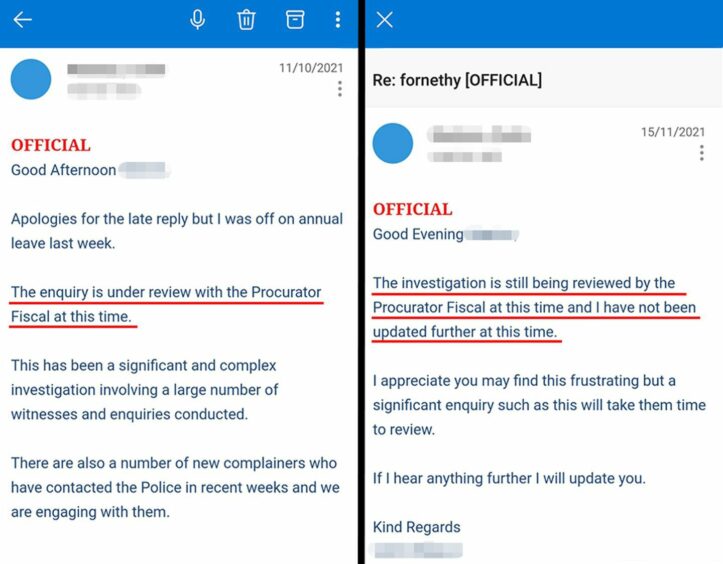
In a statement, the Crown Office confirmed this and said: “We are working closely with police and they have updated us on their investigations into allegations of abuse, but we have not received a report.
“As there is an ongoing police investigation, we cannot comment further.”
Detective Inspector Mark Lamont, from the Tayside Division of Police Scotland, said: “In complex and challenging investigations such as this we work very closely with the Procurator Fiscal Service and we keep them regularly updated as inquiries progress. This investigation remains ongoing.
“All reports of child abuse will be fully investigated and we are committed to bring perpetrators to justice. I would encourage anybody who has been the victim of abuse, either recently or in the past, to please come forward and report the matter to us.”
Allegations of abuse not believed
At the end of their stay many victims told their parents and social workers but were never believed.
Other victims couldn’t admit what happened to them and therefore kept their abuse a secret until they discovered other pupils had been abused.
In this video, victims explain why they couldn’t tell their loved ones till much later in life.
Historian Lynn Abrams says one of the biggest issues for victims of sexual and physical abuse is that the language for such abuse did not exist then as it does now.
“It’s really difficult to share information about something you don’t really have the language to describe,” said Professor Abrams.
Fornethy House abuse test case
As well as the police, Thompsons solicitors have been working on the case for several years.
Laura Connor, partner at Thompsons, has worked on many abuse cases in her career. The law firm is bringing a test case against Glasgow City Council using a victim from Fornethy.
However, very few records surrounding Fornethy still exist, which has forced Thompsons to delay the case.
Laura Connor said: “Those at GCC (Glasgow City Council) just now don’t seem to be able or willing to provide us with records or documents relating to this home.
“Our clients were sent to Fornethy in different ways and so we do not have documents such as social work records to assist.”
The explanation given is that by law Glasgow City Council only needs to retain documentation for five years, after which they are destroyed.
A Glasgow City Council spokeswoman said: “Council officers have been helping police with their inquiries and our claims department continue to deal with claims.
“We are doing everything we can and understand how upsetting this situation must be.”
The council also said that parents had given consent for their children to go to Fornethy.
Victims have defended their parents saying they could “not have known” what kind of place they were being sent to.
Abuse victims failed by Redress scheme
Victims have accused the Scottish Government of ignoring their claims of abuse and leaving them out of a key scheme set up for victims of abuse in care.
Redress, a scheme set up by the Scottish Government for abuse victims, aims to “recognise and acknowledge what happened, and the harm this abuse caused”.
However, last year victims of Fornethy were told by Redress they were not eligible to take part in the scheme because Scottish Ministers chose to exclude those who were in short-term care.
The short-term nature of Fornethy is a result of the Glasgow Corporation’s decision to limit pupils’ stay to a maximum of six weeks. This also meant the abolition of visiting days for parents and medical officers resulting in victims being alone with staff for the entire six weeks.
Joanna McCreadie, chief executive of Redress Scotland, said while they are “committed to supporting survivors” they are limited to decisions made by the Scottish Parliament.
We asked the Scottish Government why certain abuse victims were excluded due to length of stay.
John Swinney, who leads the Redress scheme, was unavailable for an interview but a Scottish Government spokeswoman said: “The Scottish Government takes the abuse of children in all circumstances very seriously and acknowledges that the abuse of children in all settings is wrong and harmful. This should never have happened, regardless of where it occurred.”
She added: “Scotland’s Redress Scheme is primarily for those vulnerable children who were in long-term residential care, often isolated with limited or no contact with their families.”
When asked, the spokeswoman could not say if Redress could be adapted to cover victims who’s claims of abuse fall under short-term care, or if a new scheme tailored for them could be created.
Victims said they were angered by this response and feel like their suffering has been dismissed.
Violet Wilson, in response, said: “To a child, six weeks feels like a year.”
After our investigation Mr Swinney received multiple calls for Redress to include those abused in short-term care. No official changes to Redress have been made.
In 2023, The Courier learned that Mr Swinney ordered a new investigation into Fornethy House. The inquiries will focus on why children were sent to Fornethy House. Victims hope that these inquiries are just the beginning.
Fornethy survivors have suffered long enough
Throughout her life, Elaine has had to live with the memories of her experience.
Elaine told us the sexual abuse she experienced at Fornethy House greatly impacted her own sexual relationship with her husband.
To conclude this investigation Elaine went back to Fornethy. Back to where she was abused.
Other victims spoken to have also been greatly impacted.
Because of her abuse at the hands of teachers, Lynne Sheerin says “it has been hard for me to build relationships with people”.
Carol Whyte refused to go back to school after Fornethy, affecting her education and future.
Violet Wilson and other victims of Fornethy have even been diagnosed with PTSD.
Despite their trauma, victims continue to fight for justice. They have gained support from local MPs, started working on petitions and protested outside parliament.
After The Courier’s investigation their abuse was raised during First Minister’s Questions.
Anyone affected by any of the issues raised in this article or in need of assistance can call the National Association for People Abused in Childhood free of charge on 0808 801 0331, or by visiting by their website.
If you would like to get in touch with our Impact investigations reporter Brendan Duggan please email brendan.duggan@dcthomson.co.uk
Credits
Words and interviews by Brendan Duggan
Video editing by Gemma Bibby
Filming and photography by Mhairi Edwards and Kim Cessford
Drone footage and photography by Steve Brown
Scrollytelling and data visualisations by Lesley-Anne Kelly and Joely Santa Cruz
Graphics by Gemma Day
SEO by Jamie Cameron
